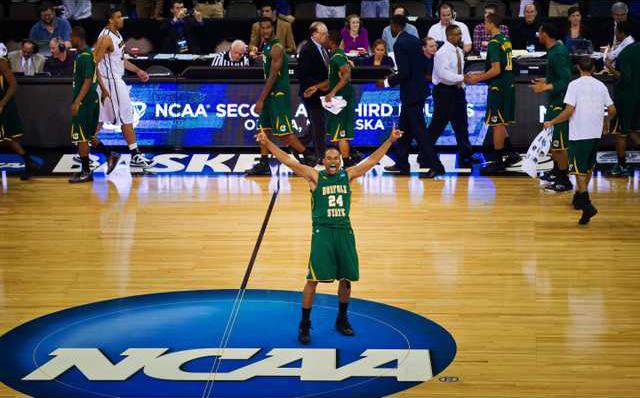Watch out, West Virginia. Be careful, California. Beware, Baylor.
Same to Maryland, Utah and Indiana — and the rest of the teams with Nos. 1-8 seeds as the round of 64 gets underway Thursday in the NCAA Tournament.
Well, maybe top seeds Kansas, North Carolina, Oregon and Virginia will be OK if history holds true. There still hasn’t been an upset by a No. 16 team since the tournament expanded to 64 teams in 1985.
But there are always a few surprises in what again is known as the first round.
Two No. 14 seeds won last season and three No. 12s advanced in 2013 and 2014. In each of the past five NCAA Tournaments, there has been at least one game in the round of 32 matching a pair of double-digits seeds.
“The numbers in March Madness are the biggest overrated thing there is,” Baylor coach Scott Drew said. “Unfortunately, people look at numbers and they think disparity, and every coach will tell you there’s nothing but parity. That’s why it’s March Madness.”
Baylor, a No. 5 seed that plays Yale on Thursday, was a No. 3 seed last March when R.J. Hunter hit a 3-pointer with 2.7 seconds remaining to give 14th-seeded Georgia State a 57-56 victory. That shot knocked the shooter’s father, the Panthers’ coach, out of his seat.
While we wait to see which double-digit seeds pull off upsets in 2016, here’s a look back at some of the biggest underdogs to start the NCAA Tournament with upsets, including one with Drew on the winning side:
— No. 15 seed Norfolk State 86, No. 2 seed Missouri 84, in 2012: With many expecting the Tigers to make a run to the Final Four, their farewell to the Big 12 Conference before departing for the SEC instead was a bracket-busting shocker. Missouri went into the game as a 21-point favorite over the MEAC champ.
— No. 14 seed Ohio 97, No. 3 seed Georgetown 83, in 2010: During that regular season, the Hoyas had beaten Syracuse and Duke, both No. 1 seeds in that NCAA Tournament. Ohio, which had won the MAC tournament that season as a No. 9 seed, is one of three No. 14 NCAA seeds that have won as 14-point underdogs. The others were UAB 60-59 over Iowa State last season and Bucknell, with only five scholarship players and a borrowed band, in a 64-63 win over Kansas in 2005.
— No. 13 seed Valparaiso 70, No. 4 seed Ole Miss 69, in 1998: Scott Drew was an assistant coach for his father, Homer, and his younger brother, Bryce, hit the buzzer-beating 3-pointer after a full-court play in 2.5 seconds to give the Mid-Continent Conference champion Crusaders a victory over the SEC West champion Rebels. Two other No. 13 seeds have beaten 12-point favorites: San Diego over Connecticut in 2008, and Southwestern Louisiana over Oklahoma in 1992.
— No. 12 seed Creighton 83, No. 5 seed Florida 82, double overtime in 2002: Fans filling out brackets almost always pick a No. 12 seed, or two or three. Last year was the first since 2007 without a No. 12 winner. While 2002 was the first time three No. 12s won in the same NCAA Tournament, Creighton stood out because of Terrell Taylor’s 3-pointer with 0.2 seconds left in the second overtime.
For the record, here are how seeds have fared since 1985 in the round of 64, according to STATS LLC:
1 vs. 16 — 124-0
2 vs. 15 — 117-7
3 vs. 14 — 104-20
4 vs. 13 — 99-25
5 vs. 12 — 80-44
6 vs. 11 — 81-43
7 vs. 10 — 76-48
8 vs. 9 — 63-61
Before 1st NCAA upsets of 2016, some past underdog winners





